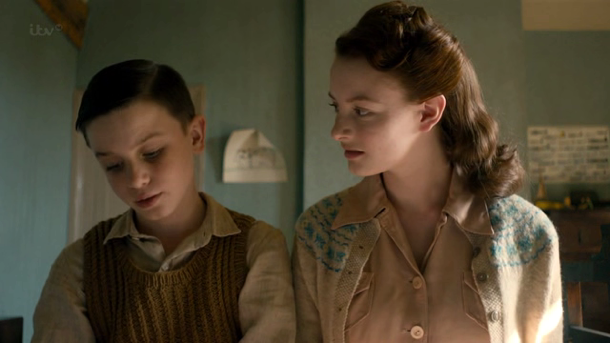Why you can trust GamesRadar+
Lightfields 1.05 “Episode Five” TV REVIEW

Episode 1.05
Writer: Simon Tyrell
Director: Damon Thomas
THE ONE WHERE In 1944 the Felwoods get ready to pack up and leave Lightfields. Dwight confronts Mr Felwood, apologises and, to the surprise of both men, finds that apology acknowledged if not accepted. On the way back to the air base, Dwight is killed in a motorcycle accident caused by Lucy’s ghost. Eve reconciles with Harry who confesses he’s falling for her and, as Harry prepares to ship out and she prepares to leave, the pair kiss.
In 1975, Clare and Vivien decide to leave but Vivien has second thoughts and intends to stay without telling Clare. Clare breaks up with Nick as Vivien lies to get more sleeping pills, planning to kill herself in penance for what she thinks she did. Lucy leads her to the barn where she has flashbacks and finally recalls what happened; she saw Lucy in the burning barn, who begged her for help. She’s rescued by Tom, and when she wakes up, remembers seeing him leave the barn just before the fire started. Tom confesses he saw Lucy and Dwight together, got drunk and went back to the barn. Finding Dwight’s lighter he threw it into the straw with no idea Lucy was still in there. Vivien forgives Tom and realises there’s nothing left for her to feel guilty about either.
In 2012, Pip’s revelation about Lucy forces Lorna and Baz to confront the fact the ghost is real and Paul, drunk and desperate, decides to steal his son. Pip shows them a photo of Lucy and confesses, begging Lucy’s forgiveness. In response, she sets light to photos of her, Pip and Luke. Lucy leads the others to Paul’s car and stops him driving off with Luke. A newly-arrived guest reveals herself to be Vivien, and together she and Pip finally talk about what happened; seeing Lucy be disowned by their dad, Pip brought his sister food and a lamp. Convinced the lamp fell over and caused the fire, Pip has blamed himself for decades. Viv tells him the truth about Tom’s role in his sister’s death and Pip, like Viv and Tom, finally realises his sister was trying to tell him to forgive himself, not punish him. Pip and Luke see Lucy one last time, singing the song from the opening scene, as she walks off into the sunset.
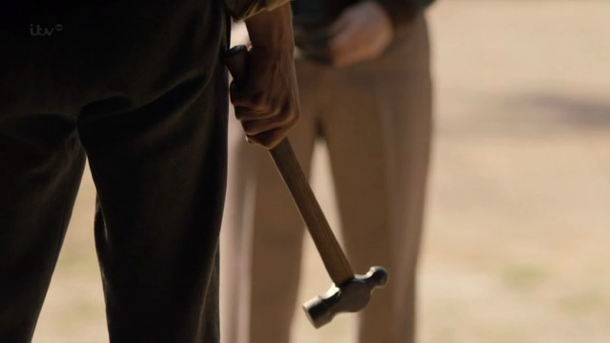
VERDICT Lightfields ’ final episode is an odd one. Structurally, the episode is brilliant as we not only spend time in all three time periods but also do so in flashbacks from one to another. There’s a point around the middle of the episode where it feels like everything is building to a massive crescendo as we discover who saw who in the barn, how the fire started, who Lucy is trying to communicate with and why. It’s a really smart, ambitious piece of structuring and it keeps you invested, and guessing, the whole way through.
The performances, one of the show’s strongest points, if anything, get better this episode. The entire episode is focused on goodbyes; as the Felwood’s pack up, Claire and Vivien get ready to leave and Paul decides to make his play for Luke, emotions run high through all three time periods. Sam Hazeldine and Jill Halfpenny in particular have a couple of very sweet, if repressed and British moments that show you where these characters are and how far they’ve come. Likewise, in 1975, Wayne Foskett’s adult Tom is finally given a chance to shine with a monologue that’s heart-felt and tragic, as he explains what really happened. Lucy Cohu also impresses, playing Viv as a fidgety, desperate woman who wants answers and is prepared to end her own life to get them. The moment where, having overdosed, she sees Lucy walking in slow motion was a great double blind and I half expected Clare to run in and find her mother’s body. However, what we got, if anything, was better, as Vivien regains her memories and takes full control of her life at long last.
2012 is just the same, with Michael Byrne, Danny Webb and Lynn Farleigh all getting moments of real emotional power. The moment Pip realises not only that he’s innocent but that his sister forgives him, Byrne’s face lights up and you can almost see the guilt and shame lift from him. Likewise, the ever reliable Danny Webb shows us an entirely different side to Baz as he confronts why he doesn’t believe ghosts are real and the tragedy in his own past. It’s clever, structured writing delivered with emotion and conviction by an amazingly talented cast. Finally, Lynn Farleigh does the impossible by not only convincingly playing the same character as Lucy Cohu but still managing to register as a sympathetic character in her own right. The final words of the series are her’s, equal parts sad and completely at peace with history in a lovely, understated moment.
The only problem is, the entire episode is too understated.
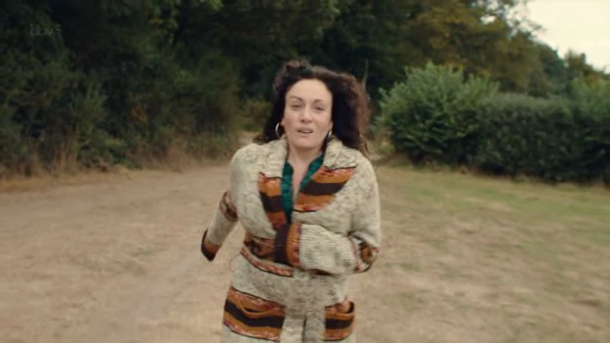
I know, I know, writer Simon Tyrell’s ability to capture that peculiarly British combination of tremendous depth of feeling and wobbly chinned refusal to express it is something I’ve praised for weeks no. But this is the final episode and, with a couple of notable exceptions, it just feels too reserved, especially Vivien remembering what she saw which feels completely flat instead of being the traumatic reveal it’s been built up as.
Each plotline is resolved, ultimately, by the characters sitting down, having a chat and deciding it’s all fine now. Which is an admirable way to run a ghost story, and God knows we didn’t want this finishing like some Gingham-drenched UK period version of The Ring with Lucy crawling out of the wireless to wreak horrible vengeance, but somehow it still feels…toothless. Lightfields has fought shy of the supernatural for four episodes and with one exception (which we’ll get to in a moment) that’s the case even here. The contrarian side of me certainly applauds the decision to have a ghost story resolved in such a well-mannered way but the rest of me can’t help but think about The Secret Of Crickley Hall , and how much more successful the (overwrought) ending of that was. Lightfields makes a similar use of different time periods and similar sense of ambiguity, but the emotional punch just isn’t there because, in the end, everything’s resolved so politely. Make no mistake, there is emotion here and plenty of it thanks to the cast, but any sense of jeopardy evaporates by ten minutes from the end and the rest is tea and apologies. Like I say it’s a brave, even successful choice but speaking personally I would have liked a little more drama.
That being said, Lightfields has never been less than entertaining and its combination of narrative complexity and ridiculously talented cast has been a pleasure to watch. Whilst this isn’t the ending I was expecting it’s certainly an ending that fits and, amazingly, gives every character their moment in the sun before the credits roll. It’s not perfect by any means, but it’s been very entertaining to watch. I honestly hope ITV make a multi-time period ghost story a regular event because based on this and Marchlands , they’re very good at it. Just next time, maybe be a little less British?
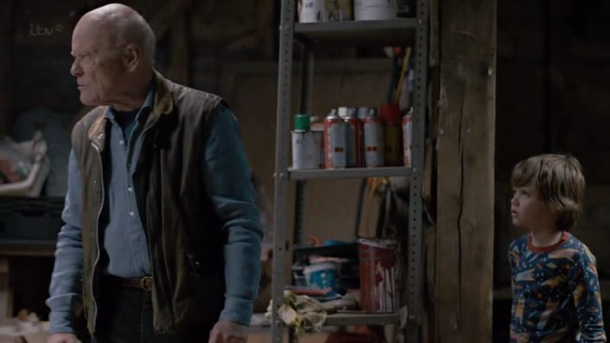
ANSWERED QUESTIONS
• How did the fire in the barn start? Tom saw Lucy and Dwight go in there and, consumed with jealousy, went and got drunk. Coming back to the barn later he found Dwight’s lighter and, wanting to express his anger somehow, lit it and threw it into the hay without any idea that Lucy was there.
• What was the message Pip sent? The “SAY NOTHING EVEN IF THEY TORTURE YOU” note, it’s implied, was to remind Viv that no one should ever know that they saw Lucy or that they came back to help her and, as far as Pip’s concerned, caused the fire.
• What happened to Vivien? She’s fine, alive and well in 2012 and noticeably less brittle than she appears in 1975.
• Why can’t she remember what happened at Lightfields? Because Vivien got back to the barn in time to see the fire take hold and a dying Lucy beg her for help. Unable to process what she was seeing, she suppressed it.
• Why did the Felwoods sell Lightfields in the first place? Because their daughter died on the farm and it became clear it was too painful to keep living there.
• What does Tom the farm hand remember? Everything. He remembers seeing Lucy and Dwight, remembers setting the fire and remembers carrying his horror at events with him until 1975 when Vivien’s return begins a series of events that lead him to realise it was just a tragic accident.
• Where is Tom in 2012? Dead.
• Why was the photo of Vivien left behind? Presumably because the Felwoods cleared out in such a hurry the photo just fell by the wayside. As tenant farmers they didn’t own the land but they could move relatively quickly, hence the entire house being packed and ready in a couple of days.
• Why does Pip think Lucy poses a danger to Luke? Because he thinks Lucy is angry at him for causing her death and wants to punish the family by manipulating Luke into dangerous situations.
• Why does Mrs Felwood want to move? Because her daughter died on the farm and she can’t heal whilst she lives there.
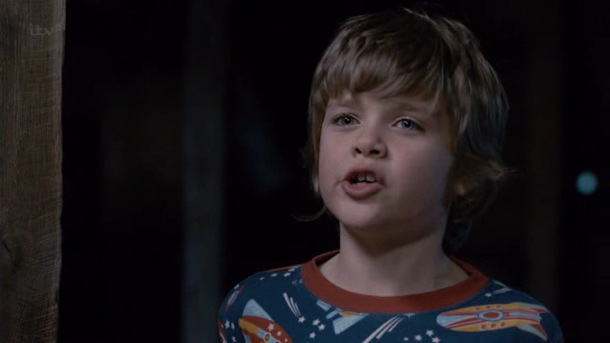
And seeing as it’s the last episode let’s take a run at the…
UNANSWERED (but probably something like this) QUESTIONS
• How did the Felwoods get Lightfields back by 2012? Because it was never their land to begin with and it looks like the farm was shut down completely not long after they left, it seems likely that Baz and Lorna went looking for it due to the family connection and picked it up fairly cheaply.
• Why was it Clare who wrote a novel about their summer at Lightfields? Based on how she’s presented in 1975, Clare’s smart, perceptive and troubled. It seems likely that while Vivien was able to move past her own problems thanks to being indirectly absolved of blame for the fire, Clare wrote the novel to work through her own issues with her parents and her mother’s mental health.
• Where’s Clare in 2012? I like to think she married disposable boyfriend Nick and is living in THAT London.
PARANORMAL TECHNOLOGY OF THE WEEK It’s one last hurrah for Electronic Voice Phenomena! The message on Clare’s “’70’s iPod” is a really nice touch as it, at first glance, feels very threatening but is actually Lucy sending Clare back to help her Mum out.
CREEPY/MASSIVELY INCONSISTENT MOMENT OF THE WEEK Why does Lucy set the pictures alight? Especially if she’s not angry with Pip? We’ve seen, or been told, that she communicates through writing or speech for the entire series and to suddenly resort to limited photographic arson sends entirely the wrong message. It also provides a nice moment of drama though which is, I suspect, why she went for it.
However, the winner is Lucy apparently killing Dwight. Dwight was clearly no good at all but killing him, as it’s clearly implied Lucy does, flies in the face of everything else we see her do. One other way of looking at it, which could have been made a lot clearer, is that Lucy appeared to him to try and talk to him and Dwight panicked. Either way it feels awkward and forced, falsely ramping the jeopardy up for the final half of the episode.
MOST UNINTENTIONALLY UNCREEPY MOMENT OF THE WEEK “She’s behind you!” In a ghost story that could legitimately be criticised for not featuring enough ghost, going down the pantomime route is not the best plan in the book.
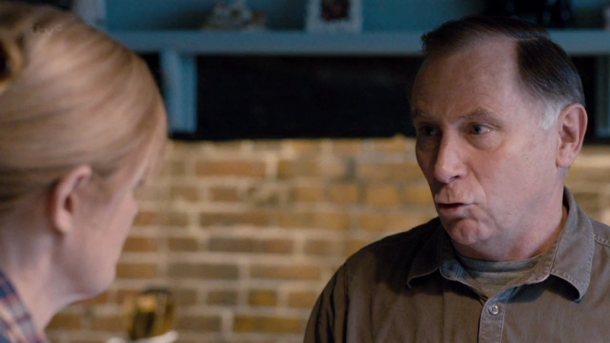
BEST LINES
“Thank you, for all you’ve done.” Sam Hazeldine corners the market in stiff upper-lipped emotion just once more.
“People die. Daughters die. They DON’T come back.” I love this, because the whole series Baz has been this perky little Jack Russell of a dude, and suddenly Danny Webb shows us Baz’s blustery bonhomie shattering. He’s horrified not just at the thought of the house being haunted but that his daughter may not be at peace either and it’s written all over his face. Danny Webb just does great work and he’s a pleasure to watch here.
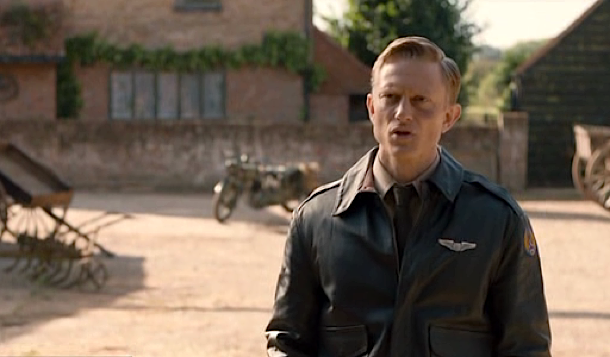
“You were right. To be afraid.” The show desperately wants you to think that Mr Felwood is going to beat Dwight to death with a hammer, even going so far as having him wear a hat and the two men facing off in a kind of sort High Noon . He doesn’t, of course, but those six words are, like so many lines in this script, simply written but immensely complex. There’s fury there, certainly but there’s also a tacit acknowledgement of Dwight’s courage in speaking to him and an acceptance of what’s happened. It’s a great scene and unfortunately it makes Dwight’s death even more out of place.
“LONDON. Where it’s all happening.” Once again the script puts so much into such a small line. I grew up on the Isle Of Man which meant if you wanted to see a current band you needed to talk to a travel agent so I can absolutely sympathise with the frustration and envy wrapped up in this line.
“Forgive me.” Vivien’s suicide note is simple and tragic and a plea for forgiveness from both Lucy and Clare. Yet more subtle, multi-layered writing.
“I’m not your boy! Not just yours, so you’ve GOT to SHARE!” Luke proves he’s the most grown-up person in the room one last time.
IT’S WOSSISNAME! Wayne Foskett, who plays the 1975 version of Tom, has been in vast amounts of British TV drama. You may have seen him in anything from Birds Of A Feather , Hetty Wainthrop Investigates and Holby City to Waking The Dead , Bodies and the most recent series of Silent Witness . However, genre fans may recognise him as John Howden from the Merlin season four episode “Lamia”.
Lynn Farleigh’s career is, frankly, staggering. She started out in Z-Cars in 1964 and since then has appeared in countless series and movies including Bergerac , Wish Me Luck , Wallander and Peep Show . Genre fans will know her best as Lady Sybil in Miss Potter , Professor Cairns in the Sherlock episode “The Great Game” and voicing the Cat in Watership Down .
Alasdair Stuart
Lightfields has finished airing on ITV
